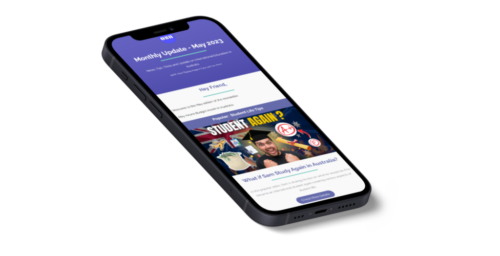
STUDENT’S STUDY GUIDE
Your Study in Australia Guide
Choose to Study in Australia. Plan your future and have a life-changing experience
What's in this Study guide?
👋 Study in Australia for International Students
Studying abroad is quite a unique experience and if you are planning to study in Australia, then it is even more exciting as Australia is quite far from many parts of the world. While it presents some challenges for international students, the opportunism are limitless as well.
This guide will give you detailed information on everything you need to know when studying in Australia as an international student.
Reasons to Study in Australia
💵 Improve English
You will improve your English as it is the common language in Australia.
💼 World-Class Education
Australia has some of the world class universities with global recognition.
📊 Course Availability
Students can choose from thousands of courses and institutions in Australia.
💪 Scholarships
Different types of scholarships are available for international students.
Requirements to Study in Australia
🛂 Student Visa
To study in Australia, you will need to get a student visa. You will have to abide by the rules and conditions of the visa as set out by the Immigration department.
📝 Passport
You have a passport to apply for a student visa. Make sure your passport have at least 6 months of validity before arriving in Australia.
📁 OSHC
You must organise an appropriate Overseas Students Health Cover (OSHC) while studying in Australia.
🗒 GTE
You must provide a personal statement that you are genuinely intending to study and improve your skills and knowledge. And not using a student visa as a way to stay in Australia.
💸 Financial Capacity
You must have evidence of enough funds to cover your airfares, course fees, insurance and living costs.
📢 English Proficiency
You must provide evidence of your english proficiency by undertaking English test (IELTS or PTE or TOEFL or OET or CEA).
🗒 COE
You need to enrol into a course of study and get Confirmation of Enrolment from a CRICOS registered education provider.
🏦 Health Requirements
You must undergo or be ready to undergo a health examination for the student visa. It will be done in your home country.
🎓 Character Requirements
You must be a good character person to study in Australia and be able to provide a police clearance certificate for assessing your character.
🤑 Common Student Question What happens if I don't attend my classes?
You are usually expected to have at least 80% attendance when studying in Australia. If your attendance in the course is low and your course progress is unsatisfactory, then it can lead to visa cancellation and deportation by the Department of Home Affairs.
Types of Courses to Study in Australia
✍ English Courses
Students can choose various English language courses include General English, Business English and Preparation for official English Tests (like IELTS, TOEFL, Cambridge).
Duration of the courses are as follow:
- Course length will depend on your level of English.
- Minimum 12 weeks program required to get a student visa.
✍ Vocational Courses
Students can study wide range of courses in VET (Vocational Education and training) programs like Certificates (I to IV), Diploma and Advanced Diploma
Duration of the courses are as follows:
- Certificates – 3 months to 1 year
- Diploma – 6 months to 18 months
- Advance Diploma – 1 to 2 years
✍ University Courses
Student can choose highest level of qualifications like Bachelor Degree, Master Degree, Associate Degree and PHD.
Duration of the courses are as follows:
- Undergraduate – 3 to 5 years
- Post Graduate – 1 to 3 years
- Doctoral – 3 to 5 years
🏛 List of Top 10 Universities in Australia
As per the QS World Rankings, these are Top 10 universities in Australia. Top 8 universities in this list are also known as Group of Eight (GO8). It’s kind of Ivy League for Australian universities.
Cost of Studying in Australia
💵 Total Cost of Studying in Australia
The total cost of studying will vary based on course you are going to study, city you are going to study, your personal lifestyle and other external factors.
Let’s explain the cost of studying with an example:
Imagine an International Student from India coming to do his 2 years Master in Accounting degree from Deakin University, Melbourne. (Living in a shared accommodation close to the university campus). The estimated cost of the study might include:
- Passport Fee: $30
- English Test: $300
- English Preparation: $300 (1 month)
- Total Course Fee: $76,000
- Medical :$200
- Visa Application Fee: $650
- Flights: $1000 (one way)
- Packing: $1000
- OSHC: $850
- Airport Pick-up: $50
- Cost of living for 2 years – $36,000
Total – $116,630
🏅 English Courses
$300 per week
👷 Vocational Courses
$4,000 to $22,000
👔 Bachelor Degree
$20,000 to $45,000
💻 Masters Degree
$22,000 to $50,000
🔍 Doctoral Degree
$18,000 to $42,000
💰 How much money should I bring to Australia for first few weeks?
While it will depend upon your personal circumstances and financial capacity, we suggest students bring around $1500 to $2500 for their few weeks stay.
This can help to cover your first accommodation,, meal expenses, transport and other living expenses for 1 to 2 months.
By that time most students find a job in Australia.
Popular Courses Among International Students in Australia
🏫 Some Popular Courses Among Students
International students in Australia study various kind of courses. Here are some of the most popular courses in Australia among international students:
🤑 Common Student Question Can I Change My Course in Australia?
Most of the students are usually allowed to change their courses in Australia. If you are going to change course to a lower level study, then you would need to apply for a new student visa. Some research based post graduate degree students are required to get minister of Home Affairs approval before changing the course.
Steps to Study in Australia
💻 How to apply to study in Australia?
The student visa application has a few specific steps that you must follow in order to have a better-planned application. Here are 10 key steps to apply for the student visa in Australia.
- Choose the course and your institution
- Check visa and institution requirements
- Plan your budget for tuition fee and cost of living
- Apply for the course directly or via an agent
- Receive your letter of offer
- Accept the offer and pay the fees
- Receive Confirmation of Enrolment (COE)
- Prepare your visa documents
- Apply for a student visa
- Get approval for a student visa
🗣 Types of Student Visas
You can study on various types of visas in Australia. The main student visa is Subclass 500.
But there are other visa subclasses that allow you to study as well. Some of the subclasses are
- Student Visa (Subclass 500) If you are planning to study long term in Australia this is the best option for you. The costs start from $650 and you are allowed to work.
- Student Guardian (Subclass 590) If you are planning to provide care to a student under 18 years. The costs start from $650 and you are not allowed to work.
- Training Visa (Subclass 407) If you are planning to take part in the structured workplace-based training. The costs start from $325 and you are allowed to work.
- Temporary Graduate (Subclass 485) If you have finished your study and planning to work in Australia. The costs start from $1730 and you are allowed to work.
- Visitor Visa (Subclasses 600, 601, 651) If you are planning for a short term study, usually less than 3 months. The costs start from $150 and you are not allowed to work.
- Working Holiday Visa (Subclass 417 and 462) If you are planning to a holiday, work and short term study in Australia (Conditions apply). The costs start from $510 and you are allowed to work.
Scholarships to Study in Australia
🎓Australia Awards
Australia Awards is an Australian Government’s prestigious scholarship offered to students from over 55 developing nations to study in Australia. This scholarship covers not only tuition fees but airfares, living costs, oshc and provides students stipends also.
🎓 Destination Australia
The aim of this scholarship is to attract and support local and international students to the regional areas in Australia. There will be 1000 scholarships worth $15,000 each year and students can study from Certificate IV level and above. You will need to apply for this scholarship directly to the eligible institutions.
🎓 Australian Government Research Training Programs (RTP)
This scholarship provides stipends and cover the tuition fee for the students who are planning to undertake Master’s or Doctorate Degree by research. You will need to apply for this scholarship directly to the participating institutions.
🎓 Other Public and Private Entities
You should check with various public and private organisations that provide scholarships to overseas students. First point of research should be your own home country government as they may have assistance or scholarships available for the students. For example, eligible students from Indonesia can apply for BPI (LDPD) scholarship program. Another good one is from Rotary Club.
🎓 Education Provider Scholarships
Most of the Australian education providers have scholarships available for overseas students in
Australia. You will need to confirm and apply for that when you are applying for your course. Usually, the scholarships are given on academic merits so having a good marks in your previous study helps. Check some of the popular scholarships from the Universities in Australia below.
💼 Popular University Scholarships
There are usually many scholarships available for international students to study in Australia. You can check all the fully funded ones from our website. But here are some popular scholarships.
Other Important things to know
✅ Pre-study Checklist
- Set up your study desk at home
- Create a timetable for studies, work and other activities
- Buy your textbooks (preferably used ones)
- Create a folder in your laptop for each study unit
- Download course materials in the folders
- Mark the calendar with important dates like exams, assessment due dates etc
- Plan your travel to the institute or university
- Understand the university map and location of lecture and tutorial rooms
- Download all the apps that might help you for your study and productivity
- Start connecting with your classmates online through university forums
- Have a bag ready with all the stationary, laptop and snacks
- Make sure your devices are fully charged
💯 Orientation
Many universities and institutions organise an orientation, also known as O -Week or Welcome Week.
The main aim of the orientation is to help students settle into their new study schedule and system.
Here are some of the things covered in the Orientation:
- About the educational institute
- About your course
- About your classes
- Tour around the campus
- Health and safety induction
- Campus facilities tour
- About the student support services
- Student clubs or unions in the institute
- Free goodies available for the students
- Getting your student ID
- Other information about working and living in Australia
✔ Practical tips for studying in Australia
- Australian education system encourage independent learning
- Most institutions value asking questions and active class participation
- There is no dress code for studying in Australian colleges and universities
- Your classes provide a foundation for building knowledge, so you must attend all classes.
- If you don’t have a computer, printer or access to Wi-Fi, don’t stress as you can get access to them at your local libraries
- Don’t copy paste or submit your friend’s or someone else’s work, you will be caught out with plagiarism which can jeopardize your student career
- Reference your sources of information. If unsure, ask you university library
- Don’t be too serious, go and talk to classmates and make new friends
- Most of the universities and educational institutes grade students based on various assignment tasks, exams, class participations
- Make sure to check the grading system of your institution as it can be confusing for newcomers.
- You will need to do lots of research in completing your assignment tasks.
- Assessments usually have strict deadlines but if you need an extension, don’t hesitate to ask your tutor or institute explaining them about your circumstances
- In exceptional circumstances, you can also defer the course but it needs to be approved by your education provider
🙋 Support Systems
In order to protect overseas students from getting exploited, various institutions, student associations, state governments, and the federal government provides various support services. Some of these services are:
Overseas Students Ombudsman
This ombudsman can help you in dealing with problems with private institutions and education providers (www.ombudsman.gov.au)
Tuition Protection Service
It is a government initiative if your institution couldn’t deliver your course of study, then the government either help you in completing course elsewhere or help you in getting a refund of uncompleted studies. (www.tps.gov.au)
Institution support services
Most of the educational institutes provide support to overseas students for completing their studies and adjusting their life in Australia Please check your university or institute’s website
AFIS and CISA
Student associations National student associations like the Australian Federation of International Students (www.afis.org.au) and Council of International Students (www.cisa.edu.au) can assist you in living and studying queries as well.
Disability support
If you have a disability and require assistance then you can contact your institution or approach the Human rights Commission to assist with your queries. (www.humanrights.gov.au)
Childcare
If you are studying in Australia through an Australian scholarship then you might be eligible for some assistance for Childcare as well. (www.australia.gov.au)

